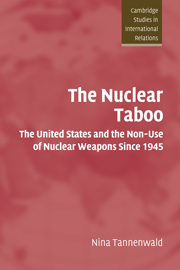Book contents
- Frontmatter
- Contents
- Preface
- List of abbreviations
- 1 Introduction: the tradition of nuclear non-use
- 2 Explaining non-use
- 3 Hiroshima and the origins of the nuclear taboo
- 4 The Korean War: the emerging taboo
- 5 The rise of the nuclear taboo, 1953–1960
- 6 Nuclear weapons and the Vietnam War
- 7 Institutionalizing the taboo, 1960–1989
- 8 The 1991 Gulf War
- 9 The taboo in the post-Cold War world
- 10 Conclusion: the prospects for the nuclear taboo
- Select bibliography
- Index
- CAMBRIDGE STUDIES IN INTERNATIONAL RELATIONS
5 - The rise of the nuclear taboo, 1953–1960
Published online by Cambridge University Press: 22 September 2009
- Frontmatter
- Contents
- Preface
- List of abbreviations
- 1 Introduction: the tradition of nuclear non-use
- 2 Explaining non-use
- 3 Hiroshima and the origins of the nuclear taboo
- 4 The Korean War: the emerging taboo
- 5 The rise of the nuclear taboo, 1953–1960
- 6 Nuclear weapons and the Vietnam War
- 7 Institutionalizing the taboo, 1960–1989
- 8 The 1991 Gulf War
- 9 The taboo in the post-Cold War world
- 10 Conclusion: the prospects for the nuclear taboo
- Select bibliography
- Index
- CAMBRIDGE STUDIES IN INTERNATIONAL RELATIONS
Summary
Nuclear weapons will become conventional for several reasons, among them cost, effectiveness against enemy weapons, and ease of handling.
Lt.-Gen. James M. Gavin, War and Peace in the Space Age, 1958As late as 1958 Lt.-Gen. James Gavin, a principal promoter in the US military of the development of tactical nuclear weapons, could still confidently assert that they would become just another weapon in the US arsenal because of their clear military utility and cost-benefit advantages. Indeed, during the 1950s, numerous US leaders fully expected that nuclear weapons would eventually become “just another weapon.” Secretary of State John Foster Dulles accepted the “ultimate inevitability” that tactical nuclear weapons would gain “conventional” status. Admiral Arthur Radford, chairman of the Joint Chiefs of Staff under President Dwight Eisenhower, predicted in 1956 that the use of nuclear weapons “would become accepted throughout the world just as soon as people could lay their hands upon them.” Instead, the developing public opprobrium against such weapons continued to grow. To the distress of Eisenhower and many of his advisors, it came to apply to all nuclear weapons, not just to large bombs or to certain types or uses of nuclear weapons.
In Chapter 4 I showed how, already during the Korean War, a tentative taboo on nuclear weapons constrained US leaders from a casual resort to their use, even though such weapons might have been militarily useful in the war.
- Type
- Chapter
- Information
- The Nuclear TabooThe United States and the Non-Use of Nuclear Weapons Since 1945, pp. 155 - 189Publisher: Cambridge University PressPrint publication year: 2007

